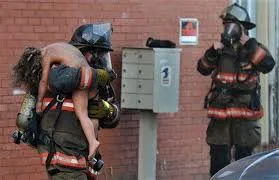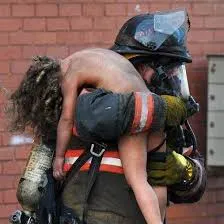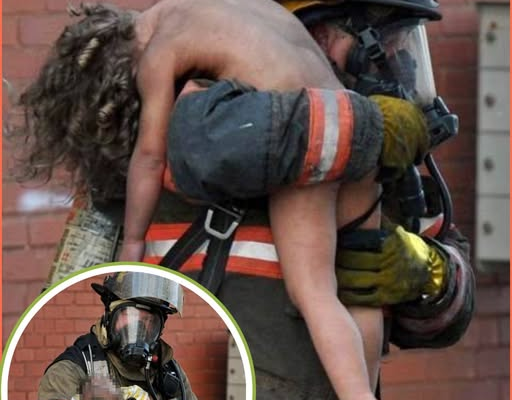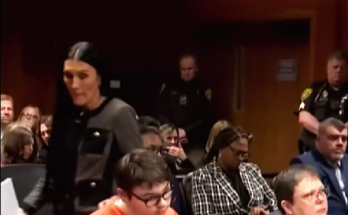Thick black smoke billowed into the sky, the stench of burning wood and melted plastic choking the air. Fire trucks screamed down the street, sirens splitting the chaos as firefighters leapt into action. Neighbors stood helplessly at the curb, their faces pale with horror as flames devoured the old brick building.
Then, over the roar of fire and shouts, a cry pierced through the confusion:
“My baby! My baby is still inside!”
The mother’s voice broke, raw with terror. She clutched at anyone who would listen, pointing at the building swallowed by fire. To her, nothing else mattered—her child was trapped, and time was running out.
One firefighter stepped forward. His turnout gear was already blackened with soot, his helmet heavy on his head, but his eyes behind the visor were calm and determined. He checked his oxygen tank, tightened the straps of his mask, and without a moment’s hesitation, disappeared into the inferno.

Inside, the world was unrecognizable.
The heat was suffocating, pressing against him like a physical weight. Flames clawed at the walls, beams creaked as they threatened to collapse, and the air was so thick with smoke that visibility shrank to inches. His flashlight beam cut through the haze in jagged swaths, bouncing off debris and shattered glass.
“Is anyone here?” he shouted, his voice muffled behind the mask.
At first, there was nothing but the roar of fire. Then—faintly—he heard it. A cough. Weak, broken, but unmistakably human.
He pushed toward the sound, heart pounding faster with every step. And there, in the corner of a room covered in ash and wreckage, lay a small child. Her tiny body was limp, her curly hair matted with soot, her bare skin streaked with grime. She looked impossibly fragile, as though the fire itself had stolen the breath from her lungs.
The firefighter dropped to his knees, his gloved hand trembling as he reached for her. He felt her chest—there it was, a heartbeat, faint but steady. Relief flooded through him. Without hesitation, he scooped her up, cradling her against his chest.
Her body was warm from the fire’s heat, her limbs dangling over his arms. He pressed her close, his voice low and urgent, though muffled through the mask:
“Hold on, little one. I’ve got you.”
The way out was harder than the way in.
The fire seemed angrier now, collapsing beams, spitting sparks, filling the halls with suffocating smoke. He shielded the child with his own body, pushing forward one step at a time, every muscle screaming from the weight of gear and heat. His breath came in ragged pulls, his oxygen tank hissing with each inhale.
And then—light.
With a final burst of strength, he charged through the doorway and into the open air.

For a moment, the world went silent.
The crowd outside froze, staring at the figure that emerged from the smoke: a firefighter, covered in soot and sweat, carrying a child limp in his arms. The girl’s curls spilled over his shoulder, her small legs hanging loose. To the watching neighbors, it looked as though she was lifeless, a tragedy pulled from the flames.
Gasps broke the silence. Some people screamed. Others fell to their knees, whispering prayers.
Paramedics rushed forward, quickly wrapping the child in a blanket, placing a tiny oxygen mask over her face. Seconds dragged on like hours. Then—a cough. A cry. A thin, trembling wail escaped her lungs, and it was the most beautiful sound in the world.
The crowd erupted. Neighbors sobbed openly, hands pressed to their mouths. The mother screamed her child’s name, tears streaming down her soot-stained cheeks as she reached for her daughter. She held her tightly, rocking back and forth, whispering thank-yous through gasping sobs.
And the firefighter?
He stepped back, removing his helmet, his chest heaving with exhaustion. His face was streaked with ash, his hair damp with sweat, but his eyes were steady. He didn’t seek applause or recognition. He didn’t need anyone to call him a hero. To him, it was simple: there was a child inside, and now she was safe.
Later, when asked about that moment, he would only say, “It’s my job. Every life is worth saving.”

The photo of that moment spread far beyond the neighborhood. It appeared in newspapers, across social media, in news broadcasts around the world. Strangers who had never met the firefighter or the child wept as they saw it. They shared messages of gratitude, awe, and prayers:
“Heroes don’t always wear capes—they wear helmets and turnout gear.”
“God bless this man for carrying life from the fire.”
“Every beating heart matters.”
For days, the image was a symbol—not just of tragedy, but of hope.
The child recovered. Though she might never remember the heat of the fire, the suffocating smoke, or the strong arms that carried her out, her life had been forever changed by that moment. For her mother, it was a miracle she would never forget. For the community, it was proof that courage and compassion could still shine in the darkest hours.
And for the firefighter, long after the fire was extinguished and the smoke had cleared, one memory would remain etched in his heart: the fragile weight of a child in his arms, the silence that terrified him, and then—finally—the sound of a cry. A cry that meant life had been spared.
They say firefighters don’t just carry the weight of flames. They carry the weight of lives. And sometimes, in the arms of one man willing to walk through fire, the world is reminded that heroes still walk among us—silent, steady, and burning brighter than the flames they fight.




